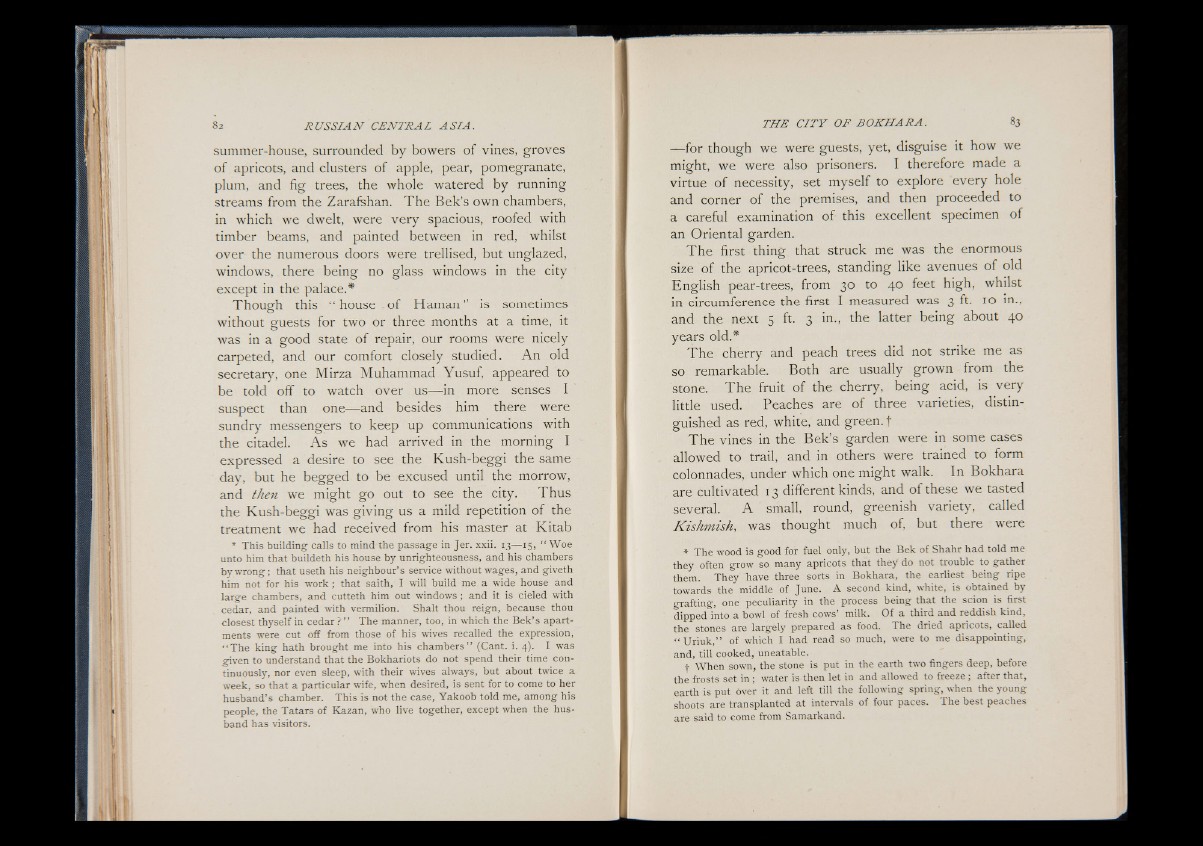
summer-house, surrounded by bowers of vines, groves
o f apricots, and clusters of apple, pear, pomegranate,
plum, and fig trees, the whole watered by running
streams from the Zarafehan. The Bek’s own chambers,
in which we dwelt, were very spacious, roofed with
timber beams, and painted between in red, whilst
over the numerous doors were trellised, but unglazed,
windows, there being no glass windows in the city
except in the palace.*
Though this “ house -of Haman” is sometimes
without guests for two or three months at a time, it
was in a good state of repair, our rooms were nicely
carpeted, and our comfort closely studied. An old
secretary, one Mirza Muhammad Yusuf, appeared to
be told off to watch over us— in more senses I
suspect than one— and besides him there were
sundry messengers to keep up communications with
the citadel. A s we had arrived in the morning I
expressed a desire to see the Kush-beggi the same
day, but he begged to be excused until the morrow,
and then we might go out to see the city. Thus
the Kush-beggi was giving us a mild repetition of the
treatment we had received from his master at Kitab
* This building calls to mind the passage in Jer. xxii. 13— 13, “ Woe
unto him that buildeth his house by unrighteousness, and his chambers
by wrong; that useth his neighbour’ s service without wages, and giveth
him not for his work ; that saith, I will build me a wide house and
large chambers, and cutteth him out windows ; and it is cieled with
cedar, and painted with vermilion. Shalt thou reign, because thou
closest thyself in cedar ? ” The manner, too, in which the Bek’s apartments
were cut off from those of his wives recalled the expression,
“ The king hath brought me into his chambers” (Cant. i. 4). I was
given to understand that the Bokhariots do not spend their time continuously,
nor even sleep, with their wives always, but about twice a
week, so that a particular wife, when desired, is sent for to come to her
husband’s chamber. This is not the case, Yakoob told me, among his
people, the Tatars of Kazan, who live together, except when the husband
has visitors.
— for though we were guests, yet, disguise it how we
might, we were also prisoners. I therefore made a
virtue of necessity, set myself to explore every hole
and corner of the premises, and then proceeded to
a careful examination o f this excellent specimen of
an Oriental garden.
The first thing that struck me was the enormous
size of the apricot-trees, standing like avenues o f old
English pear-trees, from 30 to 40 feet high, whilst
in circumference the first I measured was 3 ft. 10 in.,
and the next 5 ft. 3 in., the latter being about 40
years old.*
The cherry and peach trees did not strike me as
so remarkable. Both are usually grown from the
stone. The fruit of the cherry, being acid, is very
little used. Peaches are of three varieties, distinguished
as red, white, and green, t
T h e vines in the Bek’s garden were in some cases
allowed to trail, and in others were trained to form
colonnades, under which one might walk. In Bokhara
are cultivated 13 different kinds, and of these we tasted
several. A small, round, greenish variety, called
Kishmish, was thought much of, but there were
* The wood is good for fuel only, but the Bek of Shahr had told me
they often grow so many apricots that they do not trouble to gather
them. They have three sorts in Bokhara, the earliest being ripe
towards the middle of June. A second kind, white, is obtained by
grafting, one peculiarity in the process being that the scion is first
dipped into a bowl of fresh cows’ milk. Of a third and reddish kind,
the stones are largely prepared as food. The dried apricots, called
“ Uriuk,” of which I had read so much, were to me disappointing,
and, till cooked, uneatable.
+ When sown, the stone is put in the earth two fingers deep, before
the frosts set in ; water is then let in and allowed to freeze; after that,
earth is put over it and left till the following spring, when the young
shoots are transplanted at intervals of four paces. The best peaches
are said to come from Samarkand.